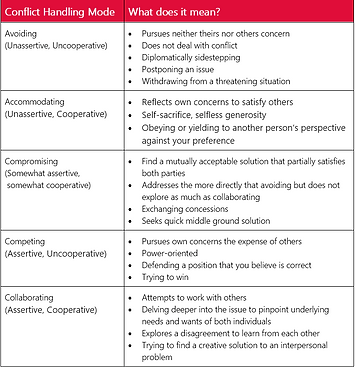

Photo by: Akson
WHAT IS
PEOPLE MANAGEMENT?
People management is the organisation of team members and the building of teams to increase productivity and efficiency in performance (Schooley, 2021). That would be putting people in the positions that is best suited for them. When roles are delegated, they should be assigned based on the individuals capabilities and strengths. In the event where there is a mistake in role delegation, the team will be affected as a whole.
Another aspect of people management is for a manager to train and collaborate with his/her team (Verlinden, n.d.). With constant encouragement and development, the team will be in a better position to excel. Interacting with the team will help managers to discover the strengths and weaknesses of the team. Strengths can be leveraged upon and weaknesses can be worked on. The chances of the team achieving their goals and objectives would increase when people management is done right.
WHAT ARE SOME TOOLS I CAN USE?


TKI identifies 2 factors when choosing a course of action in a conflict; assertiveness (on the y-axis) and cooperativeness (on the x-axis). Assertiveness is the extent to which you try to meet and satisfy your own needs. Whereas, cooperativeness is the extent to which you try to try to meet and satisfy the needs of others (Ian, 2012). This model has 5 conflict handling modes:
-
Avoiding
-
Accommodating
-
Compromising
-
Competing
-
Collaborating
Why use this tool?
It helps us to understand the dynamics of
the group and how individuals respond in the
event on a conflict.
Photo by: Jochy
Photo by: Magdalin Kasi
THOMAS KILMANN CONFLICT MODEL (TKI)
.png)
.png)
Photo by: 16personalities.com
MYERS BRIGGS TYPE INDICATOR (MBTI)
MBTI is measured by a total of 4 scales. They are:
1. Extraversion (E) – Introversion (I)
Describes how people respond and interact with the world around them
2. Sensing (S) – Intuition (N)
Looks at how people gather information from the world around them
3. Thinking (T) – Feeling (F)
Focuses on how people make decisions based on the information that they gathered from their sensing or intuition functions
4. Judging (J) – Perceiving (P)
Involves how people tend to deal with the outside world
There are 16 personalities derived from these 4 scales. Myers and Briggs believed that it when people discover and understand about themselves through the various personalities, it would help them to discover occupations that suited their personalities (Cherry, 2021)
Why use this tool?
It helps us to understand an individual and their actions. Delegation of work can be based on the personalities of the individual, where their strengths are utilised.

HOW DID I USE THE TOOL?
THOMAS KILMANN CONFLICT MODEL (TKI)
The TKI tool helped me to understand about the ways in which my group members work. Some are competing and others are compromising and there will be no hard feelings as it is just their default way of working. My group members and I felt that I am accommodating. Therefore, to reach the ideal collaboration stage, I realised that I should speak up more often to get my ideas and perpectives across to the team. In other words, I had to be slightly more open in sharing my opinions and I was not aware of this, until we used this model.
MYERS BRIGGS TYPE INDICATOR (MBTI)
In the team, Jie Lynn, Shanice and I are introverts while Rishika and Kayla are extroverts. This helped us in our role delegation where the the introverts handled internal affairs and the extroverts handled external affairs. I was comfortable with my role as head of logistics as I did not have to liaise with external parties. Though I was comfortable, the role was challenging in other aspects. As an introvert, if I had to deal with either the volunteers or sponsors, I believe that I would have been exhausted and worn out as interacting with new people drains my energy.
.png)


VALUES AND CHALLENGES OF TOOL
THOMAS KILMANN CONFLICT MODEL (TKI)
VALUES
-
Team members know each others response to conflict
-
No hard feelings as the way they respond is just their default way of dealing with conflict
-
Team members can encourage members who avoiding, accommodating, compromising and competing to move towards collaborating
CHALLENGES
-
The model shows how a person is when handling conflict, not the person as a whole
-
Does not include stress as a factor of conflict response
-
It is not fair to place people into 5 categories
MYERS BRIGGS TYPE INDICATOR (MBTI)
VALUES
-
Team members will be able to understand other members
-
Strengths of team members can be leveraged upon
-
Work delegation according to their personality will make team members more willing and happy to work
CHALLENGES
-
It is not fair to catergorise people into 16 personalities as humans are complex and everyone is different and unique to their individual self
-
Results vary from the mood and situation you are in when you take the test